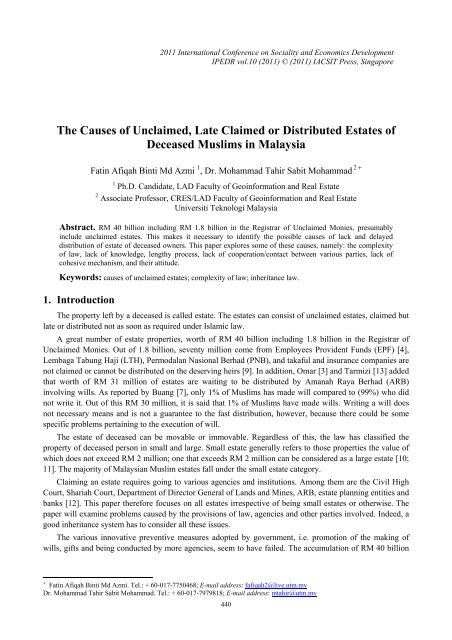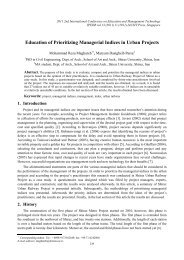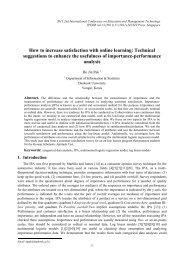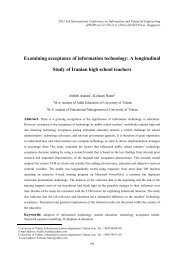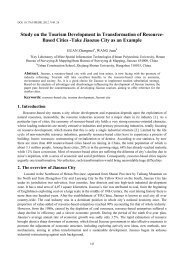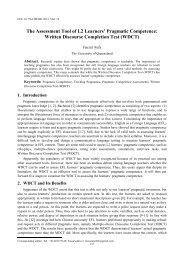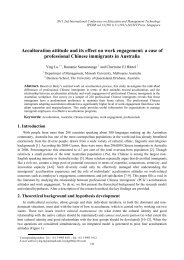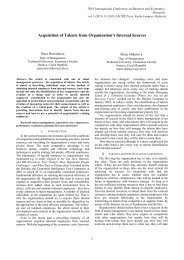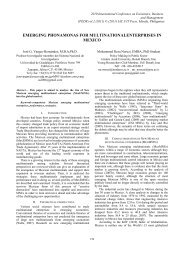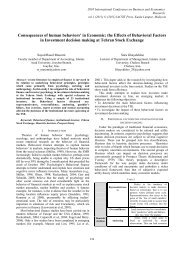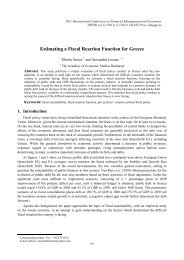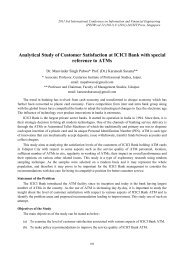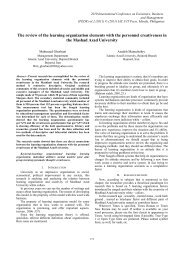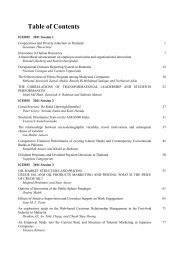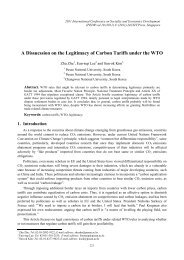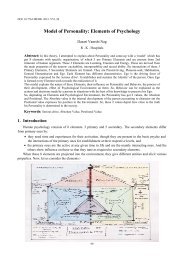The Causes of Unclaimed, Late Claimed or Distributed ... - ipedr
The Causes of Unclaimed, Late Claimed or Distributed ... - ipedr
The Causes of Unclaimed, Late Claimed or Distributed ... - ipedr
You also want an ePaper? Increase the reach of your titles
YUMPU automatically turns print PDFs into web optimized ePapers that Google loves.
2011 International Conference on Sociality and Economics Development<br />
IPEDR vol.10 (2011) © (2011) IACSIT Press, Singap<strong>or</strong>e<br />
<strong>The</strong> <strong>Causes</strong> <strong>of</strong> <strong>Unclaimed</strong>, <strong>Late</strong> <strong>Claimed</strong> <strong>or</strong> <strong>Distributed</strong> Estates <strong>of</strong><br />
Deceased Muslims in Malaysia<br />
Fatin Afiqah Binti Md Azmi 1 , Dr. Mohammad Tahir Sabit Mohammad 2 +<br />
1 Ph.D. Candidate, LAD Faculty <strong>of</strong> Geoinf<strong>or</strong>mation and Real Estate<br />
2 Associate Pr<strong>of</strong>ess<strong>or</strong>, CRES/LAD Faculty <strong>of</strong> Geoinf<strong>or</strong>mation and Real Estate<br />
Universiti Teknologi Malaysia<br />
Abstract. RM 40 billion including RM 1.8 billion in the Registrar <strong>of</strong> <strong>Unclaimed</strong> Monies, presumably<br />
include unclaimed estates. This makes it necessary to identify the possible causes <strong>of</strong> lack and delayed<br />
distribution <strong>of</strong> estate <strong>of</strong> deceased owners. This paper expl<strong>or</strong>es some <strong>of</strong> these causes, namely: the complexity<br />
<strong>of</strong> law, lack <strong>of</strong> knowledge, lengthy process, lack <strong>of</strong> cooperation/contact between various parties, lack <strong>of</strong><br />
cohesive mechanism, and their attitude.<br />
Keyw<strong>or</strong>ds: causes <strong>of</strong> unclaimed estates; complexity <strong>of</strong> law; inheritance law.<br />
1. Introduction<br />
<strong>The</strong> property left by a deceased is called estate. <strong>The</strong> estates can consist <strong>of</strong> unclaimed estates, claimed but<br />
late <strong>or</strong> distributed not as soon as required under Islamic law.<br />
A great number <strong>of</strong> estate properties, w<strong>or</strong>th <strong>of</strong> RM 40 billion including 1.8 billion in the Registrar <strong>of</strong><br />
<strong>Unclaimed</strong> Monies. Out <strong>of</strong> 1.8 billion, seventy million come from Employees Provident Funds (EPF) [4],<br />
Lembaga Tabung Haji (LTH), Permodalan Nasional Berhad (PNB), and takaful and insurance companies are<br />
not claimed <strong>or</strong> cannot be distributed on the deserving heirs [9]. In addition, Omar [3] and Tarmizi [13] added<br />
that w<strong>or</strong>th <strong>of</strong> RM 31 million <strong>of</strong> estates are waiting to be distributed by Amanah Raya Berhad (ARB)<br />
involving wills. As rep<strong>or</strong>ted by Buang [7], only 1% <strong>of</strong> Muslims has made will compared to (99%) who did<br />
not write it. Out <strong>of</strong> this RM 30 million, it is said that 1% <strong>of</strong> Muslims have made wills. Writing a will does<br />
not necessary means and is not a guarantee to the fast distribution, however, because there could be some<br />
specific problems pertaining to the execution <strong>of</strong> will.<br />
<strong>The</strong> estate <strong>of</strong> deceased can be movable <strong>or</strong> immovable. Regardless <strong>of</strong> this, the law has classified the<br />
property <strong>of</strong> deceased person in small and large. Small estate generally refers to those properties the value <strong>of</strong><br />
which does not exceed RM 2 million; one that exceeds RM 2 million can be considered as a large estate [10;<br />
11]. <strong>The</strong> maj<strong>or</strong>ity <strong>of</strong> Malaysian Muslim estates fall under the small estate categ<strong>or</strong>y.<br />
Claiming an estate requires going to various agencies and institutions. Among them are the Civil High<br />
Court, Shariah Court, Department <strong>of</strong> Direct<strong>or</strong> General <strong>of</strong> Lands and Mines, ARB, estate planning entities and<br />
banks [12]. This paper theref<strong>or</strong>e focuses on all estates irrespective <strong>of</strong> being small estates <strong>or</strong> otherwise. <strong>The</strong><br />
paper will examine problems caused by the provisions <strong>of</strong> law, agencies and other parties involved. Indeed, a<br />
good inheritance system has to consider all these issues.<br />
<strong>The</strong> various innovative preventive measures adopted by government, i.e. promotion <strong>of</strong> the making <strong>of</strong><br />
wills, gifts and being conducted by m<strong>or</strong>e agencies, seem to have failed. <strong>The</strong> accumulation <strong>of</strong> RM 40 billion<br />
+ Fatin Afiqah Binti Md Azmi. Tel.: + 60-017-7750468; E-mail address: fafiqah2@live.utm.my<br />
Dr. Mohammad Tahir Sabit Mohammad. Tel.: + 60-017-7979818; E-mail address: mtahir@utm.my<br />
440
ep<strong>or</strong>ted by media is evidence, which suggests a need f<strong>or</strong> further review. This failure could be because not all<br />
<strong>or</strong> the right causes <strong>of</strong> such accumulation were identified.<br />
2. Problems <strong>of</strong> Muslim Estates<br />
This paper suggests that there are six main possible causes <strong>of</strong> unclaimed <strong>or</strong> delayed distribution <strong>of</strong><br />
estates. This needs to be tackled in <strong>or</strong>der to prevent further accumulation <strong>of</strong> unclaimed estates.<br />
<strong>The</strong> causes <strong>of</strong> unclaimed estate can be legal and administrative constraints. <strong>The</strong>y are: (1) the complexity<br />
<strong>of</strong> law; (2) the lack <strong>of</strong> knowledge; (3) lengthy process; (4) the lack <strong>of</strong> cooperation and/<strong>or</strong> contact between<br />
various parties; (5) the lack <strong>of</strong> a cohesive mechanism; and (6) attitude that needs to be discovered.<br />
2.1. Complexity <strong>of</strong> Law<br />
<strong>The</strong>re has been a number <strong>of</strong> cases <strong>of</strong> estates remaining unclaimed because <strong>of</strong> no application has been<br />
made by the heirs. This may be so f<strong>or</strong> several reasons caused by the law.<br />
As result <strong>of</strong> classification <strong>of</strong> estates into large and small, their distribution falls within jurisdiction <strong>of</strong> two<br />
courts and two administrative agencies. Acc<strong>or</strong>ding to Section 25 <strong>of</strong> the Civil Law Act 1956, the<br />
administration <strong>of</strong> Muslim’s estate shall be in acc<strong>or</strong>dance with the Islamic law. But Article 74 (1) <strong>of</strong><br />
Malaysian Federal Constitution read with Ninth Schedule Paragraph 4 (e) (i), provides that the Civil High<br />
Court has the jurisdiction over matters relating to succession, testate and intestate, probate and letters <strong>of</strong><br />
administration. Thus, in light <strong>of</strong> Article 121A Muslims have to go to Shariah and Civil Courts f<strong>or</strong> claiming<br />
the estate <strong>of</strong> a deceased person. At the same time, Section 17 (1) <strong>of</strong> Public Trust C<strong>or</strong>p<strong>or</strong>ation Act 1995 (Act<br />
532) gives the power to ARB to dispose movable properties whether testate <strong>or</strong> intestate which is less than<br />
RM 2 million, while the claimant can go to the Land Office f<strong>or</strong> immovable properties which is not exceeding<br />
RM 2 million. Besides, Section 8 (1) <strong>of</strong> Small Estates (Distribution) Act 1955 (Act 98) prescribes ARB has<br />
the jurisdiction in small estate distribution included movable and immovable properties even though in the<br />
absent <strong>of</strong> a will. This section states that estates <strong>of</strong> Muslims, movable <strong>or</strong> immovable, exceeding RM 2 million<br />
comes within the powers <strong>of</strong> High Court. Section 77 <strong>of</strong> Probate and Administration Act 1959 (Revised-1972)<br />
(Act 97) enjoins that an execut<strong>or</strong> has unlimited power to distribute estates <strong>of</strong> a deceased person but under<br />
this Act the execut<strong>or</strong> has to apply f<strong>or</strong> letter <strong>of</strong> execution from Civil High Court. <strong>The</strong> transmission process <strong>of</strong><br />
estate, which does not exceed RM 2 million, f<strong>or</strong> example in Land Office, can begin without lawyers going to<br />
Court. It may take five and a half months [10].<br />
<strong>The</strong> existence <strong>of</strong> various regulations and the involvement <strong>of</strong> several bodies in the distribution <strong>of</strong> the<br />
estates make the law and the process <strong>of</strong> claiming estates complex, which has led to overlapping powers and<br />
the responsibilities <strong>of</strong> these entities. An heir <strong>of</strong> the deceased may be puzzled by the complexity <strong>of</strong> law and<br />
procedures, which may affect his decision to claim the estate. Even if he makes a claim, the procedures <strong>of</strong><br />
claiming estates may probably be delayed. This may be true if he made his application bef<strong>or</strong>e a wrong<br />
agency. No matter where the application is made, beneficiaries need to produce the certificate <strong>of</strong> death by the<br />
Department <strong>of</strong> National Registration. Only a specific group <strong>of</strong> beneficiaries can apply f<strong>or</strong> such a certificate.<br />
In the absence <strong>of</strong> such a group <strong>of</strong> beneficiaries a lawyer needs to be appointed. Upon production <strong>of</strong><br />
certificate <strong>of</strong> death the beneficiaries then can claim the estate. <strong>The</strong>y are given three options to settle the estate<br />
distribution under Section 15 (1) <strong>of</strong> Small Estates (Distribution) Act 1955, that is: (i) distribution under<br />
farai’d system; (ii) distribution <strong>of</strong> estate by agreement <strong>of</strong> all beneficiaries without applying the farai’d<br />
system; and (iii) all beneficiaries agree to distribute the estates to the selected beneficiaries <strong>or</strong> some<br />
beneficiaries withdraw from receiving the estates. Where first option is taken, a certificate <strong>of</strong> farai’d from<br />
Shariah High Court need to be obtained. <strong>The</strong>re might be cases where the subject estate may not be<br />
distributed f<strong>or</strong> several generations. It may then take a month to clear the case, considering the complexity <strong>of</strong><br />
the case and lack <strong>of</strong> experts.<br />
All <strong>of</strong> the above makes it clear that certain beneficiaries may not claim estate <strong>of</strong> the deceased due to such<br />
complexity and reluctance to appoint a lawyer. Yet, if they do make claim, it may take them long time to do<br />
so, and once they apply the process may be lengthy f<strong>or</strong> the reasons stated above.<br />
A delayed distribution <strong>of</strong> estates could occur in term <strong>of</strong> execution <strong>of</strong> will. Will is used f<strong>or</strong> giving a<br />
p<strong>or</strong>tion <strong>of</strong> the estate to those who are not included in the list <strong>of</strong> heirs under farai’d system, either f<strong>or</strong><br />
441
individual such as adopted child, <strong>or</strong>phaned grandchild, foster parents, non-Muslim family member, etc. <strong>or</strong> f<strong>or</strong><br />
institutions including mosque, <strong>or</strong>phanage, charitable <strong>or</strong>ganization, hospital, and others. A fatwa dated 20 th <strong>of</strong><br />
September 1973 relating to the nominees in insurance policies, Tabung Haji and EPF savings [12], make<br />
these entities to be the execut<strong>or</strong>s <strong>of</strong> the will <strong>of</strong> the deceased distribute all the said properties on the deserving<br />
heirs under the farai’d system. Under this fatwa the nomination in the insurance policy does not amount to<br />
will and the nominated person can be considered as the execut<strong>or</strong> <strong>of</strong> the estate. Disputes over the estate may<br />
occur among the heirs if the nominee insists on being the beneficiary/legatee <strong>of</strong> the insurance policies,<br />
Tabung Haji and EPF savings [12]. Problem may also arise when there exists a joint account with the<br />
deceased. In the absence <strong>of</strong> will <strong>or</strong> surviv<strong>or</strong>ship clause written in the joint account agreement [8] the assets<br />
will be divided acc<strong>or</strong>ding to farai’d under the above fatwa.<br />
<strong>The</strong> distribution <strong>of</strong> estates could be delayed by enf<strong>or</strong>cing an implied <strong>or</strong> constructive will. An implied will<br />
refers to an ineffective and problematic declaration <strong>of</strong> gift (hibah), which results into will. In Re Ismail bin<br />
Rentah (1939) 230, the deceased owner had named his daughter as nominee f<strong>or</strong> shares and all benefits from<br />
his company after the deceased’s death. After he died, the Registrar made an <strong>or</strong>der to distribute all the<br />
properties <strong>of</strong> the deceased to the family heirs acc<strong>or</strong>ding to farai’d not a gift to her. <strong>The</strong> Court held that it<br />
cannot be considered as gift because no delivery <strong>of</strong> possession has been made from the don<strong>or</strong> to the donee at<br />
the time. It only can be called gift on deathbed, which can be treated as will under the law. In another case,<br />
Rosmawati binti Sharibun & Anothers (2002) 4 AMR 4913, the issue was whether <strong>or</strong> not the deceased and<br />
his third wife’s money which were in two joint accounts could be considered as gift. It was held that the joint<br />
account did not amount to gift because the third wife did not have exclusive control over the account as she<br />
has to obtain the signature <strong>of</strong> her husband during the lifetime <strong>of</strong> the husband. In this case, no exclusive<br />
ownership has been given because the qabd (taking possession) in gift is not being fulfilled, so it cannot be a<br />
valid gift but a will.<br />
<strong>The</strong> lack <strong>of</strong> claim may be due the family structure <strong>or</strong> the status <strong>of</strong> some members <strong>of</strong> the family. When<br />
only the adopted children survive the deceased they cannot claim the estate, unless there is a will made in<br />
their favour not exceeding 1/3 <strong>of</strong> the whole estate. Additionally, secret polygamy case can be another reason<br />
f<strong>or</strong> unclaimed estates. F<strong>or</strong> example, if there has been a double tragedy involving husband and first wife, and<br />
they have no children, but the husband leaves behind a secret <strong>or</strong> unregistered second wife. Unf<strong>or</strong>tunately, the<br />
second wife may not be able to claim the deceased’s estates if their marriage is not registered, and there<br />
exists no legal documents verifying the marriage. Where the dead husband leaves behind min<strong>or</strong> children,<br />
they will have rights to the estates <strong>of</strong> their father. Under law, a guardian should be appointed to administer<br />
the deceased’s estates f<strong>or</strong> their benefit since they are unable to claim due to their age. However, the claim<br />
may be delayed if the guardian did not claim f<strong>or</strong> them to obtain the estates in time.<br />
2.2. Lack <strong>of</strong> Knowledge<br />
Both substantive and procedural law is complex and difficult to be understood by layman. <strong>The</strong> lack <strong>of</strong><br />
knowledge <strong>of</strong> the deceased and the beneficiary <strong>of</strong> his estate might cause an estate unclaimed, lately claimed<br />
and delayed distribution. Many Muslims still do not make will and gift to distribute their property because<br />
they think the farai’d system is the only way whereby their properties could be transmitted to the heirs. This<br />
may result in delayed claims and distribution <strong>of</strong> the estate. <strong>The</strong> beneficiary <strong>of</strong> the estate, one related to the<br />
deceased by blood <strong>or</strong> cohabitation as well as the baitulmal, may not know the law, the property <strong>of</strong> the<br />
deceased [9], the making <strong>of</strong> will <strong>or</strong> hibah by the deceased, and whether <strong>or</strong> not he/she is entitled to the estate<br />
<strong>or</strong> a part there<strong>of</strong>. Similarly, the lack <strong>of</strong> knowledge and understanding <strong>of</strong> law, both Shariah and Civil, legal<br />
documents, and the involvement <strong>of</strong> varies agencies may lead to no claim, late claim <strong>or</strong> delayed distribution<br />
<strong>of</strong> estate. A beneficiary may be unwilling to initiate the process <strong>of</strong> distribution <strong>of</strong> the estate because he does<br />
not know whether <strong>or</strong> not the estate can be distributed under fara’id, will <strong>or</strong> trust. Beneficiaries, in some cases<br />
may discover new list <strong>of</strong> properties, in cash <strong>or</strong> otherwise, after the application has been made. This may<br />
contribute to late claims <strong>or</strong> delayed distribution <strong>of</strong> estates. In the case <strong>of</strong> intestate estate, the law prescribes<br />
its distribution among the heirs and baitulmal. <strong>The</strong> baitulmal may not know about the estate unless an<br />
application f<strong>or</strong> fara’id certificate is made <strong>or</strong> notified by an agency about the unclaimed estates. Where no<br />
442
such notification is given, and no legal heir survives the deceased, the estate can remain unclaimed<br />
considering the ambiguity in law and the lack <strong>of</strong> clear database.<br />
2.3. Lengthy Process<br />
<strong>The</strong> empowerment <strong>of</strong> two courts under substantive law and the procedures to be followed may be the<br />
reason f<strong>or</strong> unclaimed estates simply because the process is too lengthy and costly. <strong>The</strong> High Court has been<br />
empowered to grant a Probate in testate cases under Section 3 <strong>of</strong> Probate and Administration Act 1959, and<br />
Letter <strong>of</strong> Administration in intestate cases acc<strong>or</strong>ding to Section 18 <strong>of</strong> Probate and Administration Act 1959.<br />
<strong>The</strong> period <strong>of</strong> getting a Letter <strong>of</strong> Administration is longer than Probate f<strong>or</strong> testate estates. It may take up to<br />
four years to settle the case. Additionally, the Shariah Court has been vested with jurisdiction to ascertain the<br />
eligible heirs and their shares and to issue the certificate <strong>of</strong> farai’d to that effect [5]. Application to claim the<br />
estate involves costs; this may play significant role in making the beneficiaries <strong>of</strong> the estate not to claim it,<br />
especially when the value <strong>of</strong> the subject property after distribution is relatively small. In cases where an<br />
application is made by the beneficiaries, the time between application and final settlement <strong>of</strong> the case will be<br />
long and theref<strong>or</strong>e the distribution <strong>of</strong> the estate will also be long.<br />
2.4. Lack <strong>of</strong> Cooperation and/<strong>or</strong> Contact Between Various Parties<br />
Occasionally, the don<strong>or</strong> and trustee might not be in constant contact and theref<strong>or</strong>e the possibility <strong>of</strong><br />
claiming and distributing the estates will be remote. <strong>The</strong> trustee may come to know about the demise <strong>of</strong> the<br />
don<strong>or</strong> after a year <strong>or</strong> so, and thereafter he may initiate the process <strong>of</strong> claiming the estate f<strong>or</strong> the beneficiaries.<br />
In this case, the claim might be made late, which may also result in delayed distribution. Further, the<br />
distribution <strong>of</strong> estates could be delayed due to the lack <strong>of</strong> contact and cooperation between the beneficiaries.<br />
<strong>The</strong>y may not wish to attend the hearing <strong>or</strong> no decision could be made by the relevant agency because there<br />
is dispute between parties. <strong>The</strong>re might also be cases when a trustee does not discharge his responsibility and<br />
does not inf<strong>or</strong>m the beneficiaries about the estate <strong>or</strong> about the existence <strong>of</strong> declaration <strong>of</strong> will, gift <strong>or</strong> trust.<br />
Here, the estate may remain unclaimed.<br />
2.5. Lack <strong>of</strong> Cohesive Mechanism<br />
<strong>The</strong> lack <strong>of</strong> necessary database on the movable and immovable estates <strong>of</strong> the deceased owner may make<br />
the estates unclaimable. <strong>The</strong>re is no link between the Department <strong>of</strong> National Registration and other relevant<br />
agencies such as Land Office, Courts, Amanah Raya Berhad, banks and others in <strong>or</strong>der to access the required<br />
databases on dead persons, the identification cards and certificate <strong>of</strong> birth, certificate <strong>of</strong> marriage, grant <strong>of</strong><br />
land, current land taxation receipt and movable estates statements. Currently all inf<strong>or</strong>mation are obtained by<br />
individuals <strong>or</strong> lawyer through application. <strong>The</strong>re is no single body where all the above inf<strong>or</strong>mation can be<br />
accessed, claims can be speedily processed, <strong>or</strong> adjudicated. <strong>The</strong>ref<strong>or</strong>e, the distribution <strong>of</strong> an estate will be<br />
slow, expensive, discouraging and subject to a family tussle [9] based on farai’d, will, gift, and trust.<br />
2.6. Attitude<br />
Maj<strong>or</strong>ity <strong>of</strong> Malaysian Muslims are less sensitive to know their rights to inheritance [9], how and where<br />
to claim, as well as they might be less sensitive as to why they should apply. Indeed, the level <strong>of</strong><br />
consciousness about estate planning is still lower. Though, the imp<strong>or</strong>tance <strong>of</strong> having a will has been stressed<br />
upon, especially through banks, co-operatives and related bodies, educational and promotional programmers<br />
and also electronic media [4], it is presumed that such may not necessarily prevent the delayed in the<br />
distribution <strong>of</strong> estates.<br />
<strong>The</strong> distribution <strong>of</strong> estate may also be delayed by a claim made by non-Muslim relative <strong>of</strong> a deceased<br />
Muslim person. As the law is clear in Islam, and the convert knowingly excludes his non-Muslim family<br />
members there should remain no question about the rights <strong>of</strong> the non-Muslims to inherit from the said estate.<br />
Yet, claims are made by non-Muslims to the properties <strong>of</strong> their deceased kin. In the case <strong>of</strong> Federal Islamic<br />
Religious Council v Lim Ee Seng (2000), the High Court <strong>of</strong> Malaya held that a f<strong>or</strong>mer wife’s claim to her<br />
f<strong>or</strong>mer husband properties is dismissed because he had converted to Islam and she has no rights under<br />
Islamic inheritance law. In the above case, the dispute by the non-Muslim family member will cause further<br />
delay and the distribution can take place only after the court makes a decision about it.<br />
443
2.7. Conclusion<br />
Irrespective <strong>of</strong> whether <strong>or</strong> not a person passes away testate <strong>or</strong> intestate, due to the above six reasons, his<br />
estate is prone to being unclaimed, claimed but not sooner as should be, and distributed very late. In any<br />
event, it impedes the economics <strong>of</strong> individual, industry and government. <strong>The</strong> latest preventive measures<br />
introduced by government and undertaken by various bodies seem to be not as effective as one could wish.<br />
<strong>The</strong> accumulation <strong>of</strong> unclaimed RM 40 billion and so, as publicised by media, strongly suggest the above<br />
conclusion. <strong>The</strong>ref<strong>or</strong>e, the ref<strong>or</strong>m <strong>of</strong> the law and procedure is needed. F<strong>or</strong> this, a study is needed in <strong>or</strong>der to<br />
overcome the problems <strong>of</strong> complexity <strong>of</strong> law, lengthy and costly process, and non-cohesive mechanism, lack<br />
<strong>of</strong> knowledge and cooperation, and attitude <strong>of</strong> various parties.<br />
3. Acknowledgements<br />
<strong>The</strong> auth<strong>or</strong> would like to thank the anonymous reviewers f<strong>or</strong> useful comments. Zamalah/Institutional<br />
Scholarship provided by Universiti Teknologi Malaysia and the Ministry <strong>of</strong> Higher Education <strong>of</strong> Malaysia<br />
finances the w<strong>or</strong>k.<br />
4. References<br />
[1] Civil Law Act, 1956 (Act 67), 2006. <strong>The</strong> Commissioner <strong>of</strong> Law Revision Malaysia in Collab<strong>or</strong>ation with Malayan<br />
Law Journal Sdn Bhd and Percetakan Nasional Malaysia Berhad. www.lawnet.com.my<br />
[2] Federal Constitution, 2006. <strong>The</strong> Commissioner <strong>of</strong> Law Revision Malaysia in Collab<strong>or</strong>ation with Percetakan<br />
Nasional Malaysia Bhd. www.lawnet.com.my<br />
[3] Omar, R. (2009). Wasiat: Tool f<strong>or</strong> Islamic Estate Planning as Practiced at Amanah Raya Berhad. IFWMI<br />
Intellectual Discussion on Islamic Finance and Wealth Management. Presented Paper. Islamic Finance and<br />
Wealth Management Institute (IFWMI). Universiti Sains Islam Malaysia.<br />
[4] Patrick Sennyah (2007). RM 40b Waiting To Be Given To Heirs. New Sunday Times, pp: 3.<br />
[5] Probate and Administration Act 1959 (Revised-1972) (Act 97), 2006. <strong>The</strong> Commissioner <strong>of</strong> Law Revision<br />
Malaysia In Collab<strong>or</strong>ation With Percetakan Nasional Malaysia Bhd www.lawnet.com.my<br />
[6] Public Trust C<strong>or</strong>p<strong>or</strong>ation Act 1995 (Act 532), 2006. <strong>The</strong> Commissioner <strong>of</strong> Law Revision Malaysia In<br />
Collab<strong>or</strong>ation With Percetakan Nasional Malaysia Bhd. www.lawnet.com.my<br />
[7] Salleh Buang (2010). Instrumen Perancangan Harta Pusaka Islam: Amanah dan Hibah. Convention <strong>of</strong> Islamic<br />
Small Estate Planning System 2010. Institut Kefahaman Islam Malaysia (IKIM).<br />
[8] Shahanaaz Habib (2010). When <strong>The</strong> Money Is Tied Down. www.wasiat4u.com<br />
[9] Siti Mashitoh binti Mahamood (2008). Isu-isu Berbangkit Dalam Pengurusan Baitulmal Di Malaysia: Pemakaian<br />
Akta Wang Tak Dituntut 1965. Jurnal Pengurusan JAWHAR. Vol. 2, No. 1, 2008, pp: 99-113.<br />
[10] Sittamparam, R. (2009). RM 2m Limit to Small Estates from Sept 1. New Sunday Times, (August 16).<br />
[11] Small Estates (Distribution) Act 1955 (Act 98), 2006. <strong>The</strong> Commissioner <strong>of</strong> Law Revision Malaysia In<br />
Collab<strong>or</strong>ation With Percetakan Nasional Malaysia Bhd. www.lawnet.com.my<br />
[12] Suhaili Al-Ma’amun (2010). Islamic Estate Planning: Malaysian Experience. Kyoto Bulletin <strong>of</strong> Islamic Area<br />
Studies (March 2010), pp: 165-185.<br />
[13] Tarmizi Abdul Rahim (2009). RM 31j Harta Pusaka Masih Tidak Dituntut. Utusan Malaysia, (May 2009), pp: 23.<br />
444


